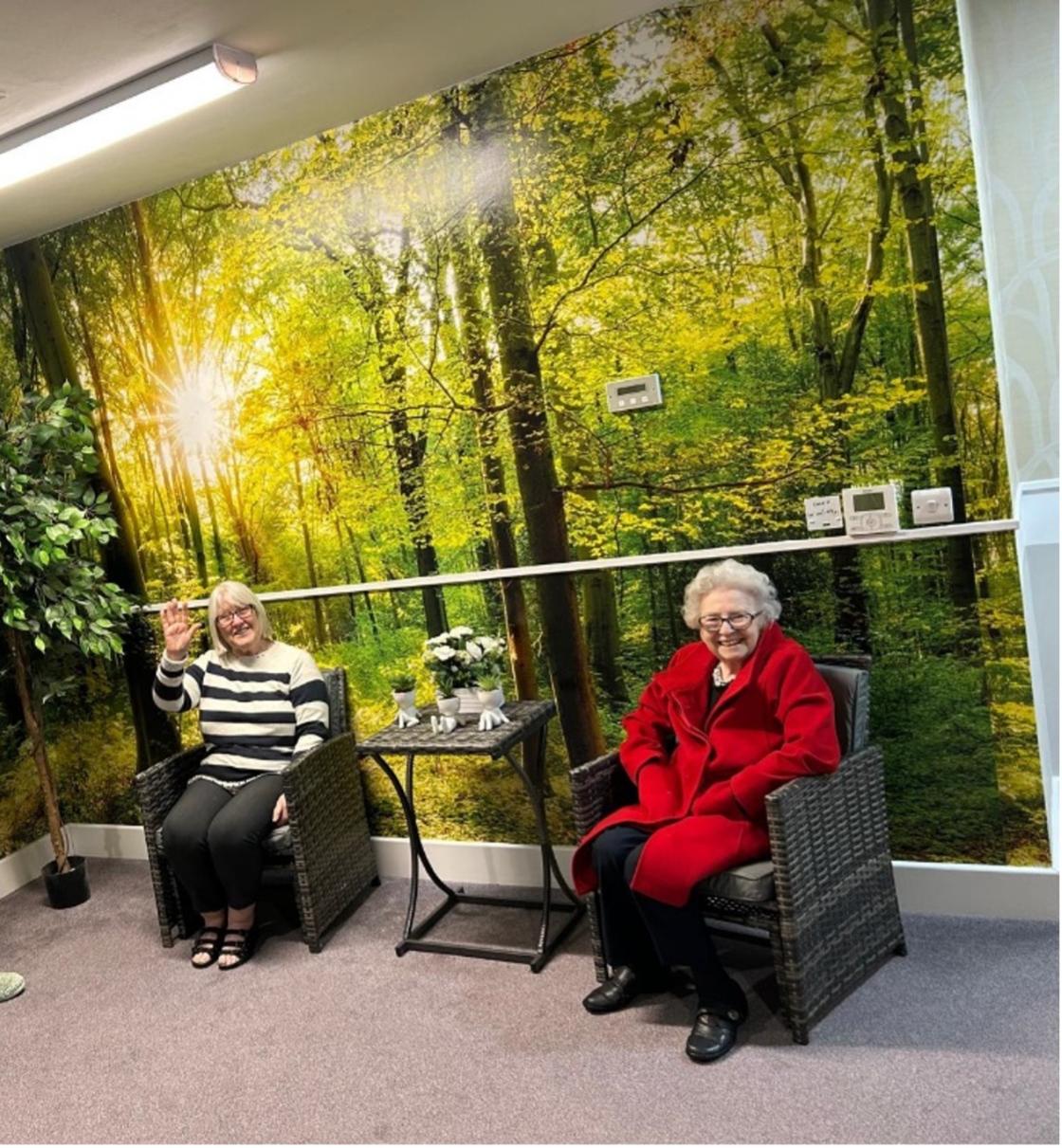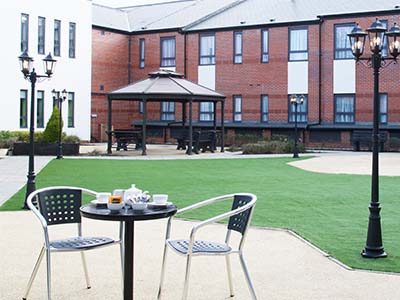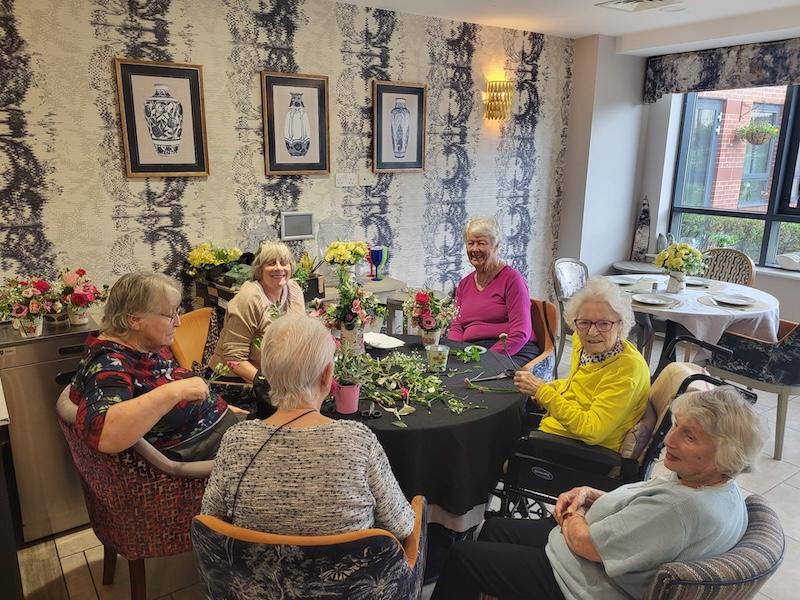The Importance of a Dedicated Dementia Community

Dementia is a complex condition that affects memory, cognitive abilities, and overall well-being. With nearly a million people in the UK currently living with dementia, the demand for high-quality dementia care is extremely high. One way care homes provide specialised support is by having dedicated communities throughout their care types.
A well-designed dementia-friendly environment can make a significant difference in the quality of life for people living with dementia. From minimising confusion and distress to promoting independence and social interaction, these communities offer a safe and nurturing space tailored to the unique challenges of dementia.
Understanding Dementia and When it Would be the Right Time For a Care Home
Dementia is an umbrella term for a range of brain diseases that lead to cognitive decline, with Alzheimer’s disease being the most common. Symptoms typically begin with mild memory loss and difficulty concentrating before progressing to more severe impairments that affect a person’s ability to communicate, make decisions, and carry out daily tasks.
The early signs of dementia can be subtle, including difficulty remembering recent events, whether medication has been taken, struggling to find the right words, or becoming easily confused. As the condition advances, people living with dementia may experience changes in behaviour, mood swings, and difficulties recognising family and friends. In the later stages, individuals often require full-time nursing support as they are no longer able to live independently.
Because dementia affects each person differently, providing person-centred care is crucial. A dedicated dementia community ensures that care services are specifically designed to meet the needs of people at every stage of the condition, helping them maintain dignity, confidence, and a fulfilling life for as long as possible alongside like-minded individuals.

The Role of a Dedicated Dementia Community
A well-structured dementia environment is about more than just physical safety; it’s about creating a place of belonging, purpose, and comfort for residents. Many care homes now offer dedicated dementia communities that provide a range of tailored services, from specialised activities to enhanced safety measures. Here’s our top 5 reasons why these communities are so vital:
1. A Safe and Supportive Environment
People living with dementia can experience disorientation, confusion, and mobility difficulties, which increases their risk of falls and injuries. A dementia-friendly care home and a dedicated community take these factors into account by providing clear signage, wide hallways, accessible bathrooms, and calm, clutter-free spaces. Good lighting and colour contrast help residents navigate their surroundings with confidence, while enclosed gardens offer a safe space for outdoor activities without the risk of wandering.
2. Specialist Training for Staff and Carers
Providing high-quality dementia care requires an in-depth understanding of the condition and its impact on individuals. Staff working in dedicated dementia communities receive specialist training in dementia awareness, communication techniques, and person-centred care. This ensures they can effectively support residents through all stages while maintaining their dignity and individuality.
Dementia training also helps caregivers and team members recognise when residents are experiencing distress or confusion and respond in a way that reassures and comforts them. Their knowledge will also help prospective residents understand if it is the right time to move into a care home, which will provide peace of mind to loved ones. This level of understanding is essential when creating a positive and nurturing care environment.
3. Tailored Activities to Support Cognitive Abilities
Cognitive decline is one of the key dementia symptoms, but engaging in meaningful activities can help slow its progression and enhance their well-being. A dedicated dementia community provides structured activities that are designed to support memory, creativity, and social interaction.
Common activities include:
- Reminiscence therapy – This encourages residents to recall and share past events, using photo albums, music, or familiar objects.
- Sensory Stimulation – Using different textures, scents, and sounds can create a calming and engaging experience.
- Arts and Crafts – This supports creativity through making objects whilst encouraging improved fine motor skills and self-expression.
- Music therapy – Listening and dancing to different types of music is proven to enhance mood and reduce anxiety in people with dementia.
- Gardening and Gentle Exercise – This promotes physical health while providing a sense of purpose and vitamin D to residents.
These activities not only provide enjoyment but also help maintain their identity and sense of self-worth which in hand reduces symptoms of loneliness and low moods.


4. Mealtime Support
Maintaining a healthy diet is essential for all older adults, but dementia can present unique challenges when it comes to eating and drinking. Some people living with dementia may struggle to recognise food, forget to eat, or develop difficulties with swallowing.
In a care home with a dedicated dementia community, meal times are carefully planned to encourage good nutrition and hydration. Dining areas are designed to be calm and easy to navigate, with visual cues to help residents understand what’s on their plate. Specialist cutlery, plate designs, and food textures are also used to make eating easier and more enjoyable
5. Emotional and Social Support for Residents and Their Families
A dementia diagnosis affects not just the individual but also their family, friends, and carers. The emotional impact can be overwhelming, and many families struggle with the transition to a nursing or residential care home.
When residing in a care home, the team ensures that family members are included in their loved one’s care journey, offering guidance, advice, and regular updates on their well-being. Many care homes also provide support groups, counselling services, and open visiting policies, allowing families to maintain strong connections with their relatives throughout their entire care journey.
For residents, social interaction is key to maintaining a sense of belonging and reducing feelings of isolation. Whether through shared mealtimes, group activities, or simply spending time with carers and companions, these communities foster friendships and meaningful relationships.
A Space to Unwind
When a care home provides a dedicated dementia community, residents can have constant reassurance that they are in a space that is purpose-built for them. They can enjoy a continuum of care, as they won't need to move care homes as their condition progresses and have peace of mind that there are areas for both social interaction and calmness.
When taking part in activities, they have complete freedom on whether they want to get involved or do something different. A typical dementia community will include several features including destination points or quiet areas which will encourage residents to unwind when they need it. This allows residents to differentiate areas based on how they are feeling such as communal areas for group interactions, quiet rooms for unwinding or their luxury bedroom if they would like to spend time alone or one-on-one with their carer.

Exceptional Dementia Care at Amberley Care Home
At Amberley Care Home in Sale, Manchester, we are committed to providing outstanding dementia care within a dedicated and welcoming community. Our purpose-built environment has been thoughtfully designed to support the needs of people living with dementia, ensuring they receive the highest standard of care in a safe and homely setting. Alongside this, we also offer first-class residential care, nursing care, respite care and palliative care.
Our team of highly trained caregivers and nursing professionals are passionate about providing person-centred care, helping residents maintain their independence and enjoy a fulfilling life. Through tailored activities, delicious and nutritional meals, and a compassionate approach to care, we strive to make a positive difference for every individual and their loved ones.
Our dementia community is built with our residents at the forefront, including destination points built based on their retained memories. We understand the importance of providing a sensory-rich environment for our residents which allows them to connect with their surroundings and enjoy a better quality of life here at Amberley.
If you would like to learn more about the dementia care services at Amberley Care Home or would like advice on transitioning into our luxury care home in Cheshire, we warmly invite you to get in touch with our friendly team. We are here to support you every step of the way.





